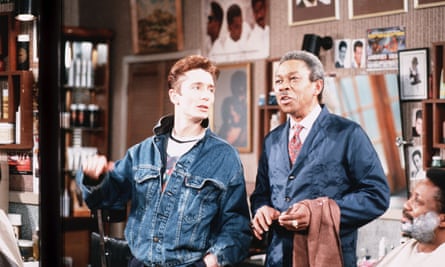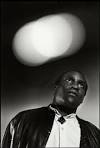TRIX WORRELL
Trix was born in St. Lucia in 1959 and came to live in England at the age of five. As a teenager, he worked with the Albany Theatre in South London, where he wrote and directed his first play, School’s Out, in 1980 and
He was educated at the National Film and Television School, where he took up writing, because there were so few good parts for black actors to play.
In 1984, he won Channel Four Television’s “Debut New Writers” with his play Mohicans, which was broadcast as Like a Mohican in 1985.
In 1984, he won Channel Four Television’s “Debut New Writers” with Mohicans, which was broadcast as Like a Mohican in 1985. In the late 80’s, Channel Four was interested in commissioning a new sitcom, and Worrell contacted producer Humphrey Barclay to discuss possible ideas. On his way to the meeting, he saw a barber shop, with three barbers looking out the window ogling the women who walked past. This served as the inspiration for the writing that would come to life on UK screens as Desmond’s.
Desmond’s was one of Channel Four’s most successful programmes, producing seven series in five years, from 1989 to 1994. Through Desmond’s, Worrell was able to work through some of the complex issues which are important features of black migrant experiences in Britain that would make sense to both black and white audiences, and to show that black families experience the same joys and problems as white families.
Source: 100 Great Black Britons website.
Desmond’s at 30: ‘I wrote it for white people’
Interview with The Guardian’s Ross Davies, Friday 4 January 2019
One morning in 1988, Trix Worrell, a young St Lucia-born writer, was sat on the top deck of the number 36 bus going from Peckham to central London. He had just won Channel 4’s debut writing competition, and had been invited to meet distinguished producer Humphrey Barclay and propose a new black sitcom.
But he had no idea what to pitch, and had never written comedy before. As the bus stopped at the traffic lights on the Queens Road, he was drawn to a scene below in a West Indian barber shop.

“It was called Fair Deal,” recalls Worrell, “and there were these barbers, their noses pressed against the front window, chirpsing the girls walking past. And I could see the customers in their chairs, half-lathered and half-shaved, waiting to get their hair cut, but thinking nothing of it whatsoever. That’s when it came to me.”
Worrell knew barber shops as hives of chat and gossip conducted over endless games of dominoes – and where the chances of getting an actual haircut were sometimes slim. “The black barber is a community and a drop-in,” he says. “And, more crucially, a space where black people can just be black.”
By the time he reached Barclay’s office, the kernel had crystallised into what would become Channel 4’s longest-running sitcom, Desmond’s, aired for the first time on 5 January the following year. But to hear Barclay tell it, the show almost never came to light.
“My heart sank at his pitch,” he remembers. “There had already been several series set in salons, which tended to feature ladies with blue hair. So I wasn’t excited at all. But he shook his head and said, ‘Have you ever been in a West Indian barber shop?’ Then he started to tell me more. The more he told, the more I liked it.”
Desmond’s was not the first black sitcom on British TV – that would be The Fosters, which ran from 1976 to 1977, featuring Norman Beaton and Carmen Munroe (who played Desmond and Shirley Ambrose) and a young Lenny Henry. That show, however, was not an original creation, adapted from US sitcom Good Times. So what marked Desmond’s out?

Image: A still from Desmonds showing the original cast, including Carmen Monroe and Norman Beaton.
“It was the first black business you really saw on television,” says Worrell. “It doesn’t matter that the guy can’t cut hair! More than that, the underlying principle was if you’re a minority in a predominantly white society, you have to laugh. Comedy is what keeps you going.”
The show’s popularity was cemented by the second episode of the second series, Hold De Front Page, in which the barber shop was held up by two violent, if hapless, teenagers armed with guns. It was uncharted waters for a British sitcom and by the end of that series, five million people were tuning in.
“We knew we were doing something different,” says Worrell. “I have to take my hat off to Michael Grade [then chief executive of Channel 4], who supported us when it was a real risk. But it reflected the growing violence on the streets.”

‘We knew we were doing something different. It was a real risk’ … Desmond’s.Photograph: Channel 4
Desmond’s showed the lives of the Ambrose family, who all longed to improve their lot. Desmond, played by the late Beaton, dreams of retiring and returning to Guyana; Shirley, his wife, enrols in a French evening class in the opening episode; yuppy eldest son Michael aims to run the local bank; middle child Gloria wants to be a fashion writer; and youngest son Sean is on course to go to university.
Like most great sitcoms, Desmond’s thrives on its running gags and side characters: the frequent jubilant cry “Yeah, mon” of Desmond’s best friend Porkpie; Matthew, the perennial student from the Gambia with a penchant for “old African sayings” such as “the respectful goat doesn’t fart in front of the chief”; and gossiping hypochondriac Beverley.
Filmed in front of a raucous live audience (“those guys were off the Richter scale,” says Worrell), Desmond’s, at its best, was an exultant celebration of family and friendship in the face of adversity. In the show’s most poignant episode, Georgetown Dreaming, Desmond ponders what life might have been if he had never come to this “godforsaken country”.
Might he already be retired, having achieved glory through the Georgetown Dreamers, his one-time band? Would his children have escaped racism and discrimination? Or as Shirley – always the voice of reason – points out, “we could have done a lot worse”. Cue an alternate history of squalor in the Caribbean, with Desmond a milquetoast, Shirley a drunk and Michael a violent hoodlum.
At its core, Desmond’s was a family show, says Ram John Holder, who played Porkpie, its warmth transcending racial fault lines. “It didn’t matter if you were black or brown or white,” he says. “It was the story of every family.”
“I didn’t write Desmond’s for black people,” says Worrell. “I wrote it for white people so they could see how black people really are. At that time, the negative press about muggings and shootings was all we seemed to get. I was fed up with it.”
Desmond’s ran for 71 episodes, ending in 1994 due to Beaton’s health. Danny Boyle featured a clip in the best-of-British-TV segment of his 2012 Olympics opening ceremony, and the series is now available to watch on All 4. But its legacy is also local, and community drama group Theatre Peckham will perform the first ever episode on 5 January to coincide with the anniversary.
“It’s an important part of the cultural history of this country,” says Holder. “An artistic achievement.”
“When I started out, they made braver choices in television,” says Worrell. “While there might be all these workshops today to increase the presence of minorities on screen, it’s just about boxes being ticked. In reality, I don’t think we’ve moved on.
“Unless your name’s Toby or Ben, it’s really difficult for black writers to get commissioned. As much as it’s nice to see Desmond’s on All 4, there’s nothing brave about recommissioning it. How about something different?”
So what would the Ambroses be doing today? Without a beat, Worrell replies: “Desmond and Shirley are stuck in Guyana, unable to return because of the whole Windrush nonsense.”





